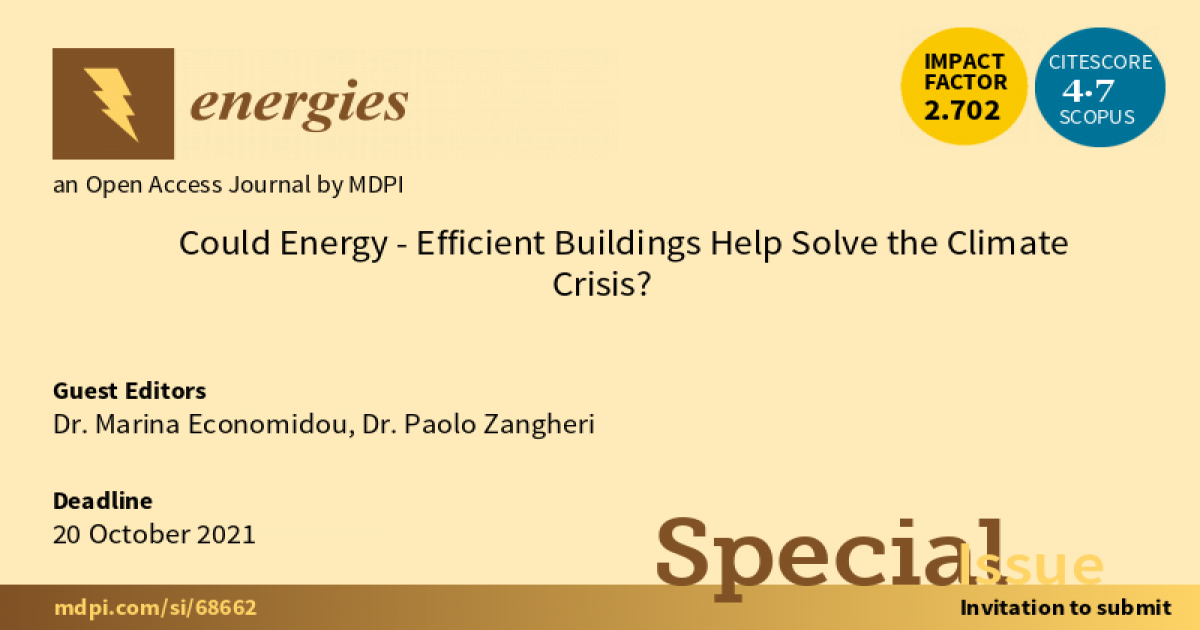Could Energy-Efficient Buildings Help Solve the Climate Crisis?
A special issue of Energies (ISSN 1996-1073). This special issue belongs to the section "G: Energy and Buildings".
Deadline for manuscript submissions: closed (15 November 2021) | Viewed by 2721

Special Issue Editors
Interests: energy savings; green buildings; sustainability; sustainable development; energy efficiency; policy
Special Issue Information
Dear Colleagues,
Around 40 % of the energy we use and a third of GHG emissions we emit are attributed to buildings, much of which is wasted due to outdated construction practices, poor designs, inefficient systems or equipment, lack of effective control systems or suboptimal user behaviour. Although the energy efficiency potential of buildings is widely documented in the literature, achieving this potential will require widespread implementation of best practices and technologies and the deployment of innovative solutions, new financing tools, stringent building codes and ambitious policies. New buildings perform increasingly well, however the existing building stock represents a huge challenge that exhibits an inherent resistance to change as indicated by the relatively low rates of renovation. Yet, buildings must play a central role in the energy transition to help solve the climate crisis. This special issue aims to address the advances in research related to the role of buildings in the green energy transition. Topics will broadly include, but are not limited to:
- Innovations in design, construction, and operation of buildings and their equipment, as well as changing user behaviours and attitudes
- Effective policies and tools to accelerate energy renovations in buildings
- Impact of decarbonisation scenarios on the building sector
- Climate change impact on future energy use in buildings.
Dr. Marina Economidou
Dr. Paolo Zangheri
Guest Editors
Manuscript Submission Information
Manuscripts should be submitted online at www.mdpi.com by registering and logging in to this website. Once you are registered, click here to go to the submission form. Manuscripts can be submitted until the deadline. All submissions that pass pre-check are peer-reviewed. Accepted papers will be published continuously in the journal (as soon as accepted) and will be listed together on the special issue website. Research articles, review articles as well as short communications are invited. For planned papers, a title and short abstract (about 100 words) can be sent to the Editorial Office for announcement on this website.
Submitted manuscripts should not have been published previously, nor be under consideration for publication elsewhere (except conference proceedings papers). All manuscripts are thoroughly refereed through a single-blind peer-review process. A guide for authors and other relevant information for submission of manuscripts is available on the Instructions for Authors page. Energies is an international peer-reviewed open access semimonthly journal published by MDPI.
Please visit the Instructions for Authors page before submitting a manuscript. The Article Processing Charge (APC) for publication in this open access journal is 2600 CHF (Swiss Francs). Submitted papers should be well formatted and use good English. Authors may use MDPI's English editing service prior to publication or during author revisions.
Keywords
- building design, construction, operation
- energy efficiency
- policies and best practices
- zero energy buildings
- cost effective energy renovations
- climate change impact
- user behaviour
Benefits of Publishing in a Special Issue
- Ease of navigation: Grouping papers by topic helps scholars navigate broad scope journals more efficiently.
- Greater discoverability: Special Issues support the reach and impact of scientific research. Articles in Special Issues are more discoverable and cited more frequently.
- Expansion of research network: Special Issues facilitate connections among authors, fostering scientific collaborations.
- External promotion: Articles in Special Issues are often promoted through the journal's social media, increasing their visibility.
- e-Book format: Special Issues with more than 10 articles can be published as dedicated e-books, ensuring wide and rapid dissemination.
Further information on MDPI's Special Issue polices can be found here.






